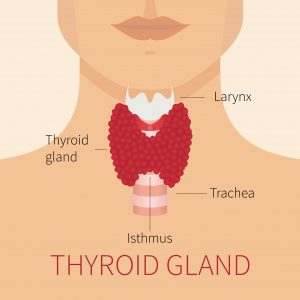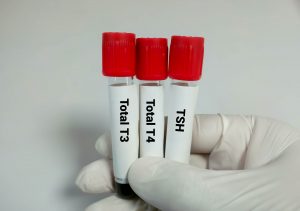Women's Health
Thyroid Conditions and Their Management

Your thyroid creates and produces hormones that play a vital role in many different systems throughout your body.
An estimated 5-10% of Singapore’s population is suspected to suffer from thyroid disorders, and these disorders can harm the individual if left untreated.
What Is a Thyroid Gland?
The thyroid gland is a butterfly-shaped organ located in the front of your neck, wrapped around your windpipe (trachea). Hormones are secreted to control a variety of metabolic processes, including growth and energy expenditure. The metabolism will be altered whether the thyroid gland is hyperactive or sluggish.

How Does a Thyroid Gland Function?
The thyroid gland converts iodine, which is obtained through diet, into thyroid hormones such as thyroxine (T4) and triiodothyronine (T3). The only cells in the body that can absorb iodine are thyroid cells. T3 and T4 are produced when iodine and the amino acid tyrosine are combined in these cells. The thyroid hormones T3 and T4 are subsequently released into the bloodstream and carried throughout the body, where they regulate metabolism.
Types of Thyroid Conditions
Hyperthyroidism
Hyperthyroidism is a condition where the thyroid gland is hyperactive and hence produces an excessive amount of thyroid hormone. Hyperthyroidism can be caused by either the presence of autoimmune antibodies, such as that seen in Graves Disease, or a toxic nodule that is secreting an excessive amount of thyroid hormone.
Symptoms of hyperthyroidism includes:
- Restlessness
- Irritability
- Increased heart rate
- Intolerant of heat
- Anxiety
- Insomnia
- Tremors
- Weight loss
- Menstrual irregularities
Hypothyroidism
Hypothyroidism is the reverse of hyperthyroidism. It is a condition to describe an underactive thyroid gland, whereby there is an insufficient production of thyroid hormone.
Symptoms of hypothyroidism includes:
- Lethargy and tiredness
- Mental health issues
- Dry coarse skin
- Cold intolerance
- Hoarse voice
- Constipation
- Weight gain
- Heart issues
- Water retention
- Menstrual irregularities
Hashimoto’s Disease (Hashimoto’s Thyroiditis)
Hashimoto’s disease is an autoimmune condition affecting the thyroid gland. An autoimmune disorder is an illness caused by the immune system attacking healthy tissues. In Hashimoto’s disease, immune-system cells attack the thyroid hormone producing cells leading to cell death. The disease usually results in a decline in hormone production (hypothyroidism).
Hashimoto’s disease is more common among middle-aged women, although anyone can develop the condition. It may present as a goitre or any of the symptoms of hypothyroidism. The primary treatment is life-long thyroid hormone replacement.
Graves’ Disease
Graves’ disease is an immune system disorder that results in the overproduction of thyroid hormones (hyperthyroidism). It is the most common cause of hyperthyroidism.
Although Graves’ disease may affect anyone, it’s more common among women and in people younger than age 40. It presents with symptoms of hyperthyroidism. The primary treatment goal is to reduce the amount of excessive thyroid hormone that the body produces.
The same antibody that affects the thyroid gland resulting in the production of excessive thyroid hormone can sometimes attach itself to the muscles of the eyes and cause swelling and bulging of the eyes (exopthalmus).
Goitre
A swelling of the thyroid gland is known as goitre. Iodine deficiency in the diet is the most common cause of goitre worldwide.
If the goitre isn’t severe, there may be no symptoms. If the goitre gets large enough, it may cause one or more of the following symptoms, depending on the size:
- Neck swells or tightens
- Coughing or wheezing
- Difficulty in breathing or swallowing
Thyroid Nodules
Thyroid nodules are solid or fluid-filled lumps that form within the thyroid gland. The majority are benign and don’t cause symptoms, but a small fraction of them can be cancerous.
The majority of thyroid nodules are asymptomatic. You often won’t know you have a thyroid nodule until your doctor discovers it during a routine medical exam. Or it may be an incidental finding from scans that are performed during health screening.. Some thyroid nodules, however, may become large enough to be visible or make it difficult to swallow or breathe.
A small proportion of thyroid nodules may produce thyroid hormones and cause hyperthyroidism., Symptoms are similar to those of hyperthyroidism when this happens.
Management of thyroid nodules depends on the type of thyroid nodule you have. Your doctor may advise that you have a fine needle aspiration and cytology (FNAC) to determine the type of cells in the nodule and hence its risk of being cancerous. Certain factors increase your risk of thyroid cancer, such as a family history of thyroid or other endocrine cancers and having a history of radiation exposure.
Tests Related to Thyroid Conditions

Thyroid-stimulating hormone (TSH) Test
TSH is a pituitary hormone that instructs the thyroid on how much thyroid hormones, such as thyroxine (T4) and triiodothyronine (T3), to produce.
Hypothyroidism, or an underactive thyroid, is most commonly indicated by a high TSH level. This indicates that your thyroid is producing insufficient hormones. As a result, the pituitary gland continues to produce and release TSH into your bloodstream.
Hyperthyroidism, or an overactive thyroid, is usually indicated by a low TSH level. As your thyroid produces too much hormone, the pituitary gland stops producing and releasing TSH into your bloodstream.
Free T4 (FT4) and Free T3 (FT3)
Hyperthyroidism can be diagnosed by a high FT4 and/or high FT3 level in the blood, while Hypothyroidism can be diagnosed by a low FT4 level. Testing both T4 and T3 levels can help accurately diagnose hyperthyroidism.
Thyroid Antibody Tests
Thyroid antibody levels can aid in the diagnosis of autoimmune thyroid disorders like Graves’ disease (the most common cause of hyperthyroidism) and Hashimoto’s disease (the most common cause of hypothyroidism). Thyroid antibodies are produced when your immune system mistakenly assaults your thyroid gland. If the findings of other blood tests indicate thyroid disorder, your doctor may order thyroid antibody tests.
Radioactive Iodine Uptake Test
The thyroid uptake test, commonly known as a radioactive iodine uptake test, can be used to determine the reason for hyperthyroidism. This test is called an uptake test because the thyroid “takes up” iodine from the blood to generate thyroid hormones. For a week before the test, your doctor may advise you to avoid foods high in iodine, such as kelp, or drugs containing iodine.
You will consume a little amount of radioactive iodine in liquid or pill form for this test. During the test, you will sit in a chair while a technician places a gamma probe near your thyroid gland in front of your neck. The probe detects the amount of radioactive iodine absorbed by your thyroid from your blood.
You should not get this test if you are pregnant or breastfeeding, despite the fact that it employs a little amount of radiation and is regarded to be safe.
Conclusion
Thyroid conditions can be detected through a multitude of tests and scans. Early intervention may benefit the patient, allowing for a full recovery.
Read this next ...
WHO WE ARE
About SOG Health Pte. Ltd.
Established in 2011, SOG Health Pte. Ltd. (“SOG”) is a leading healthcare service provider dedicated to delivering holistic health and wellness services to the modern family.
With a long and established track record in Singapore providing Obstetrics and Gynaecology (“O&G”) services such as pre-pregnancy counselling, delivery, pregnancy and post-delivery care, the Group has since further expanded its spectrum of healthcare services to include Paediatrics, Dermatology, and Cancer-related General Surgery (Colorectal, Breast & Thyroid).
The Group’s clinics, under its four operating segments of O&G, Paediatrics, Oncology and Dermatology, are strategically located throughout Singapore to provide easy access to its patients.
- Obstetrics
- Gynaecology
- GynaeOncology
- Breast, Thyroid & General Surgery
- Colorectal, Endoscopy & General Surgery
- Dermatology
- Paediatrics
Consult With A Specialist From SOG
Visit one of our specialists today to learn more about your health!
Recommended Specialists
Book An Appointment
Fill up this form and our clinic will get back to you shortly.
For general enquiries, please click here.




